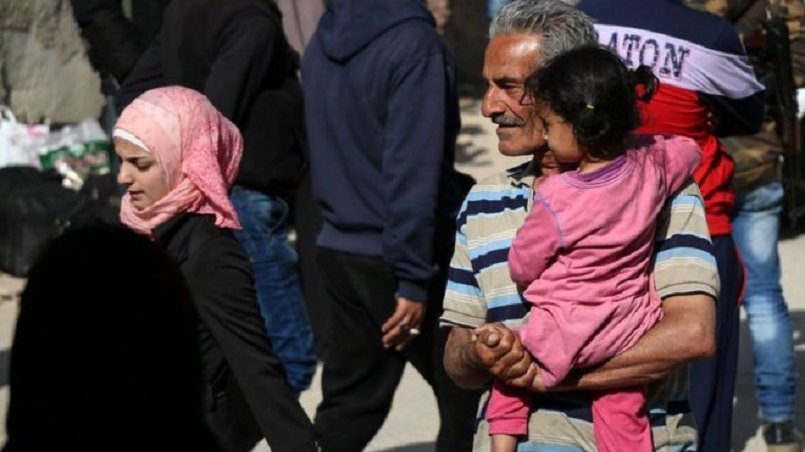
Rebel fighters and their families have begun leaving a besieged area of the Syrian capital Damascus, under a new evacuation deal with the government.
Up to 1,500 people were expected to leave the Barzeh district in the north-east of the capital on Monday, a monitoring group said.
Most are being transported to the rebel-held northern province of Idlib.
The deal comes two days after powers backing opposing sides in Syria's war created four "de-escalation" zones.
Russia and Iran - allies of President Bashar al-Assad - signed a memorandum with Turkey, a key opposition supporter, calling for:
- A pause in fighting and air strikes for six months in and around the rebel-held areas
- Unhindered aid deliveries
- The return of displaced civilians
The memorandum also calls on all parties to fight jihadists from so-called Islamic State and Hayat Tahrir al-Sham (HTS), an al-Qaeda-linked alliance once known as al-Nusra Front.
The largest de-escalation zone includes Idlib, as well as adjoining areas of Hama, Aleppo and Latakia provinces.
The other three are in northern Homs province, the Eastern Ghouta region outside Damascus, and in the southern provinces of Deraa and Quneitra.
The Qaboun district of Damascus, which borders Barzeh and has come under attack by government forces since the memorandum came into force, is not included in the Eastern Ghouta zone.
A Russian defence ministry official quoted by Reuters news agency said on Friday that this was because Qaboun contained HTS positions.
The de-escalation zones are intended to shore up a partial cessation of hostilities brokered by Russia and Turkey at the end of last year, which both sides have accused each other of violating repeatedly.
The UN special envoy to Syria, Staffan de Mistura, called the initiative an "important, promising, positive step in the right direction". However, neither Syrian government nor rebel representatives signed up to it at talks in Kazakhstan last week.
Syrian Foreign Minister Walid Muallem told a news conference in Damascus on Monday that government forces would abide by the memorandum so long as the rebels did but he dismissed the idea of UN observers.
"International forces, under the supervision of the UN, will not be present," he said. "The Russian sponsor made clear that military police will be deployed and that there will be control centres in these zones."
It was unclear if he was referring to Russian military police already on the ground but the three powers did say they might deploy troops to help secure the zones.
Mr Muallem also stressed that it was for the powers to "help" rebel factions "expel Nusra from these zones until the areas really become de-escalated".
